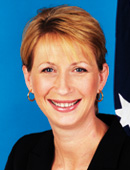
Who is your federal MP? Can’t answer? Neither can the majority of Australians – probably because many MPs are eminently forgettable.
But that’s not the case in the seat of Cunningham. Local Labor member Sharon Bird has been serving Illawarra for almost a decade, and has given her constituents plenty of reasons to remember her – they can thank her, for instance, for their hospital’s MRI machine and for over $500 million in additional federal spending coming their way. To those that don’t reside in this Bird’s nest, ask yourself how your MP stacks up.
So just who is Sharon Bird? Where did she come from? And was her journey to Canberra as effortless as a bird taking flight?
Not exactly.
Unlike many politicians, Bird – who joined the Labor Party at the age of 15 way back in 1977 – was given a second chance following her loss to Greens Representative Michel Organ in the 2002 by-election. With his win, Organ pulled off two Australian firsts. He secured the first ever seat in the Lower House for the Greens, and became the first non-ALP member to represent Cunningham since the seat was declared in 1949.
Unusual circumstances surround the surprise ALP loss in 2002.
‘This area was rusted on Labor,’ says Dr Charles Hawksley, Senior Lecturer of Politics at the University of Wollongong. Hawksley says that in 2002 Bird ‘made a factional deal with the Right and, in exchange for her support, got pre-selection for the seat of Cunningham’.
The lack of consultation – and her alleged factional jump – infuriated the Left. They responded by backing a local ‘independent’ of their own, Peter Wilson.
‘The ALP did themselves in, by splitting Bird’s vote,’ Hawksley says.
Wilson polled 10.46 per cent of the primary vote. This was enough for Organ who, with a flock of preferences, won the seat. However, it was not just the factional brawl that aided Organ’s historic win.
The electoral boundaries of Cunningham were expanded to the northeast in 1999. The more affluent suburbs of the Illawarra are located in the northeast, and hence the electorate’s demographic profile changed. Hawksley notes ironically: ‘The areas with the highest house prices tended to vote Green, in that particular election, though things reverted to type in 2004.’
Despite being shot down once by a Green, Bird’s second crack was victorious. She won Cunningham in 2004 with a handsome 11.46 per cent margin. Bird has remained the sitting member, convincingly winning the last two elections with margins of 16.87 per cent and 13.17 per cent respectively.
‘The people that she pissed off are over it now, and basically vote for Labor, and her,’ Hawksley says.
Whether or not her re-election is due to a strong personal following, Bird is an effective local member and has worked on many committees. She was the Chair of the House of Representatives Standing Committee on Education and Vocational Training from 2008 until 2010. In fact, she was serving on this committee within a few weeks of being elected. She has also served on the Employment and Workplace Relations (2008–2010); Transport and Regional Services (2004–2007); and Economics, Finance and Public Administration committees.
Bird’s hard work has not gone unnoticed and like many solid backbenchers, she has ultimately been rewarded. The re-shuffle instigated by Kevin Rudd’s leadership challenge landed Bird a promotion. She has joined the outer ministry as the Parliamentary Secretary for Education and Skills.
Something that has stuck with Bird her whole life is her passion for education. Before entering politics she taught at the local high school and TAFE. This promotion certainly complements her background, and gels with the commitment she made in her first speech to Parliament: to advocate for youth employment, skills training and education.
Bird has clung tightly to her roots. Her factional swing was a purely pragmatic move and ‘ideologically doesn’t make a bloody difference’, according to Hawksley. Indeed, since being elected, she claims the majority of her advocacy and lobbying of Ministers is for Wollongong University.
Professor Paul Wellings, Vice-Chancellor of University of Wollongong, echoes these sentitments.
‘Sharon has been a strong supporter and advocate of advancing Australia’s education and skills over a number of years and today’s announcement by the Prime Minister is just reward for Sharon’s efforts,’ he says.
Along with her strong support for a sustainable education system, Bird is also politically invested in where she comes from.
Bird is a born and bred Illawarrian and she prides herself on “constantly talking” to the constituents and small businesses that make up her electorate. Her family came to the Illawarra in the early 1900s to work in the mining industry, and she feels that this long tie enriches her connection with, and understanding of, the ‘whole community in we which we live’.
Although her two sons – Michael and Chris – who are not politically active, they do often ask questions about current topics and prominent politicians. Bird takes some of their queries to the Prime Minister. She says that the ALP ‘picked up a lot of the youth vote in the 2007 election’ and that ‘this is a young person saying these are the issues that really hit home’, and therefore they are important to her and the ALP.
Is Bird’s next destination the front bench? Dr Hawksley thinks not. He believes that the current federal government consists of ‘a lot of really good people, who do the committee work and the basic stuff of parliament. They don’t require the spotlight’.
Hawksley concludes: ‘Sharon Bird is probably one of those; a very good local member, but will probably never be a minister for anything.’
Stephanie Pradier is a student at La Trobe University. You can follow her on Twitter: @steph_r_renee
To view profiles of some of the other backbenchers as part of upstart’s Backbench Insiders project, click here.






